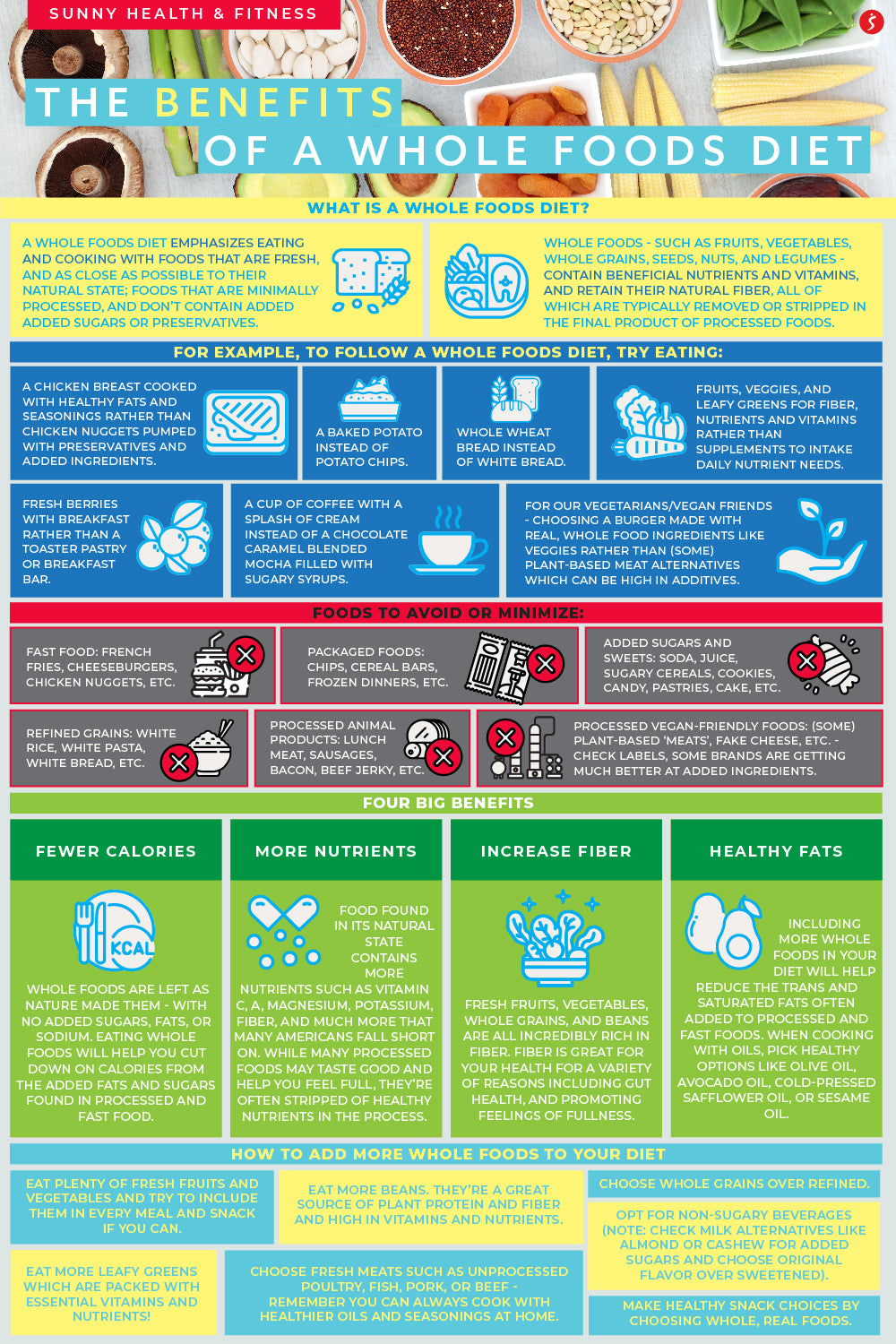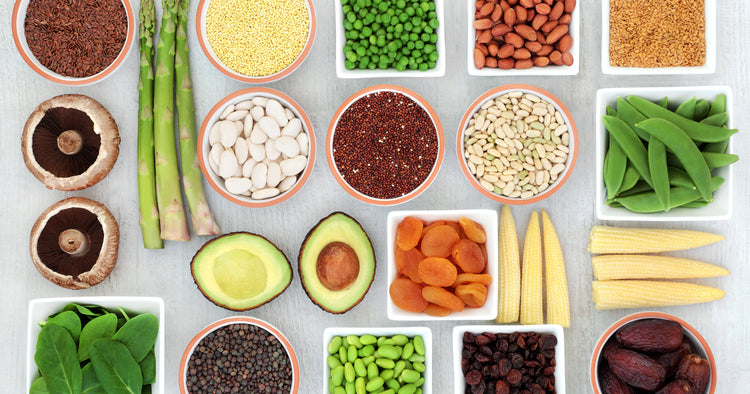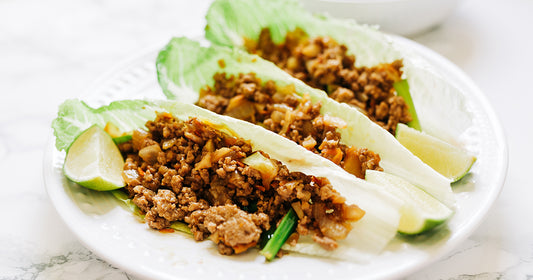There are many diets out there to choose from, but which is best for you? While you could spend all day debating between the different popular diets out there - there’s little debate when it comes to emphasizing whole, fresh foods and minimally processed ingredients for superior overall health.
The whole foods diet is less of a diet and more of a lifestyle aimed at maximizing whole, fresh foods, and minimizing processed and added ingredients. It’s a method that can be used both to improve overall health and stimulate weight loss. The best thing about it is, rather than a diet which may be used for a short term to promote weight loss or health, the whole foods diet can be maintained long term to improve overall health outcomes.
Sound too good to be true? Keep reading to find out more about a whole foods diet, the benefits of eating more whole foods, and how to start eating more whole foods today!
What is a Whole Foods Diet?
A whole foods diet emphasizes eating and cooking with foods that are fresh, and as close as possible to their natural state; foods that are minimally processed, and don’t contain added ingredients like added sugars or preservatives. Whole foods - such as fruits, vegetables, whole grains, seeds, nuts, and legumes - contain beneficial nutrients and vitamins, and retain their natural fiber, all of which are typically removed or stripped in the final product of processed foods.
For example, to follow a whole foods diet, try eating:
- A chicken breast cooked with healthy fats and seasonings rather than chicken nuggets pumped with preservatives and added ingredients.
- A baked potato instead of potato chips.
- Whole wheat bread instead of white bread.
- Fruits, veggies, and leafy greens for fiber, nutrients and vitamins rather than supplements to intake daily nutrient needs.
- Fresh berries with breakfast rather than a toaster pastry or breakfast bar.
- A cup of coffee with a splash of cream instead of a chocolate caramel blended mocha filled with sugary syrups.
- For our vegetarians/vegan friends - choosing a burger made with real, whole food ingredients like veggies rather than (some) plant-based meat alternatives which can be high in additives.
These are just a few examples, but your day is packed with opportunities to make the healthier, whole food choice. When aiming to eat whole foods, ask yourself if what you’re about to eat is a whole food. If you don’t know, check the label for added sugars, starches, or processed oils. Below are a few examples of highly processed foods that would be good to avoid or enjoy in moderation when following a whole foods diet.
Foods to Avoid or Minimize:
- Fast food: French fries, cheeseburgers, chicken nuggets, etc.
- Packaged foods: chips, cereal bars, frozen dinners, etc.
- Added sugars and sweets: soda, juice, sugary cereals, cookies, candy, pastries, cake, etc.
- Refined grains: white rice, white pasta, white bread, etc.
- Processed animal products: lunch meat, sausages, bacon, beef jerky, etc.
- Processed vegan-friendly foods: (some) plant-based ‘meats’, fake cheese, etc. - check labels, some brands are getting much better at added ingredients.
Benefits of a Whole Foods Diet
Here are 4 reasons why you should consider eating a whole foods diet. While there are many more that you should definitely look into if you’re considering a whole foods diet, these are a few of my favorites that I think make eating a whole foods diet absolutely worth it.
1. Fewer Calories
You may realize you can eat more in volume and feel more satisfied throughout the day for the same number of calories when you switch to a whole foods diet. This is a major benefit of focusing on eating real, whole foods. Whole foods are left as nature made them - with no added sugars, fats, or sodium. Eating whole foods will help you cut down on calories from the added fats and sugars found in processed and fast food.
2. More Nutrients
Food found in its natural state contains more nutrients such as Vitamin C, A, magnesium, potassium, fiber, and much more than many Americans fall short on. An easy way to increase your nutrient intake is to eat more nutritious foods! While many processed foods may taste good and help you feel full, they’re often stripped of healthy nutrients in the process.
3. Increase Fiber
Fresh fruits, vegetables, whole grains, and beans are all incredibly rich in fiber while many processed or fast-food items are not. Fiber is great for your health for a variety of reasons including gut health, and promoting feelings of fullness. Research suggests a diet rich in fiber can help lower risk of heart disease and diabetes(1).
4. Healthy Fats
Including more whole foods in your diet will help reduce the trans and saturated fats often added to processed and fast foods, while eating more whole foods will make it easier to emphasize the healthy fats found in natural food sources. When cooking with oils, pick healthy options like olive oil, avocado oil, cold-pressed safflower oil, or sesame oil.
How to Add More Whole Foods to Your Diet
The great thing about eating a diet rich in whole foods is that it doesn’t have to be all or nothing. I mean, it certainly can be if you want it to be, but for many people making a gradual adjustment to eating more whole foods and less processed is an easier change.
Since we already broke down what to avoid, I’ll leave you with some general tips for including more whole foods in your diet.
- Eat plenty of fresh fruits and vegetables and try to include them in every meal and snack if you can.
- Eat more leafy greens which are packed with essential vitamins and nutrients!
- Choose fresh meats such as unprocessed poultry, fish, pork, or beef - remember you can always cook with healthier oils and seasonings at home to control what’s added to the final product but still make it tasty.
- Eat more beans. They’re a great source of plant protein and fiber and high in vitamins and nutrients.
- Choose whole grains over refined.
- Opt for non-sugary beverages such as water, sparkling water, plain tea or coffee, fresh squeezed juices, and milk (note: check milk alternatives like almond or cashew for added sugars and choose original flavor over sweetened).
- Make healthy snack choices by choosing whole, real foods such as fresh fruit and veggies, a hard-boiled egg, or a handful of almonds.
When many people begin a whole foods diet, it can be overwhelming to think of everything you can’t eat. The truth is, there are healthy, whole food alternatives to all of your favorite foods you just might have to spend some time discovering what those are.
When in question, stick to the outer rim of the grocery store where you’ll often find the majority of fresh foods. But you can also find healthy options within the snack aisles of the grocery store. Reading food labels can help determine if a food or snack is a healthy choice. In general, the fewer ingredients the better, because the food you’re eating is closer to its natural state!

(1) “Dietary Fiber, Atherosclerosis, and Cardiovascular Disease”. US National Library of Medicine National Center for Biotechnology Information, 2019, https://pubmed.ncbi.nlm.nih.gov/31126110/. Accessed 9 September. 2020.




















